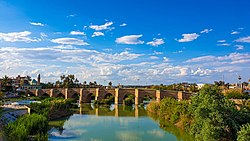
Back خانقين Arabic خانقين ARZ Xanakin Azerbaijani خانقین AZB Khanikin Catalan Khānaqīn (kapital sa distrito sa Irak) CEB خانەقین CKB Ханакин CV Chanaqin German Khanaqin Spanish
Khanaqin
خانەقین Xaneqîn | |
|---|---|
City | |
 Alwand River in Khanaqin with the historical Alwand Bridge on top of it | |
| Coordinates: 34°20′N 45°23′E / 34.333°N 45.383°E | |
| Country | |
| Governorate | Diyala Governorate |
| District | Khanaqin |
| Elevation | 183 m (602 ft) |
| Population (2008)[1] | |
| • Total | 175,000 |
Khanaqin (Arabic: خانقين;[2] Kurdish: خانەقین, romanized: Xaneqîn[3][4]) is the central city of Khanaqin District in Diyala Governorate, Iraq, near the Iranian border (8 km) on the Alwand tributary of the Diyala River.[1] The town is populated by Kurds who speak the Southern Kurdish dialect.[5] Khanaqin is situated on the main road which Shia pilgrims use when visiting holy Islamic cities.[1] The city is moreover rich in oil and the first Iraqi oil refinery and oil pipeline was built nearby in 1927.[6][7] The main tribes of Khanaqin include Kalhor,[8] Feyli,[9] Zand,[10] Malekshahi[11] Suramiri,[12] Arkavazi[13] and Zangana.[14]
The city experienced Arabization during the Saddam era, but this has been substantially reversed after the fall of the regime in 2003 and remains disputed.[1][15]
- ^ a b c d "Khanaqin". Britannica. Retrieved 23 October 2020.
- ^ "خانقين صورة حية عن التعايش السلمي في العراق". Kirkuknow (in Arabic). 1 February 2020. Retrieved 23 October 2020.
- ^ "Daişê li Gulale û Xaneqîn hêriş kirin ser hêzên Îraqê" (in Kurdish). Retrieved 20 December 2019.
- ^ "چەتەکانی داعش لە دیالە و خانەقین دەستیان بە هێرش کردووەتەوە". ANF News (in Kurdish). Retrieved 20 December 2019.
- ^ Chaman Ara, Behrooz; Amiri, Cyrus (12 March 2018). "Gurani: practical language or Kurdish literary idiom?". British Journal of Middle Eastern Studies. 45 (4): 627–643. doi:10.1080/13530194.2018.1430536. S2CID 148611170.
- ^ "Diyala (ديالى)". ISW - Institute for the study of war. Retrieved 23 October 2020.
- ^ Sorkhabi, Rasoul (2009). "Oil from Babylon to Iraq". Geo ExPro. Retrieved 23 October 2020.
- ^ Chaman Ara, Behrooz; Amiri, Cyrus (12 March 2018). "Gurani: practical language or Kurdish literary idiom?". British Journal of Middle Eastern Studies. 45 (4): 627–643. doi:10.1080/13530194.2018.1430536. S2CID 148611170.
- ^ Adel Soheil (March 2019). The Iraqi Ba'th Regime's Atrocities Against the Faylee Kurds: Nation-State. pp. 83–84. ISBN 978-91-7785-892-8.
- ^ Archibald Roosevelt (1944). "Kurdish tribal map of Iraq : showing the Iraq portion of Kurdistan and the major Kurdish tribal divisions within Iraq". Yale University.
- ^ Fattah, Ismaïl Kamandâr (2000). Les dialectes kurdes méridionaux. Acta Iranica 37. pp. 30–31.
- ^ "ایل سوره میری (سوره مهری یا سرخه مهری)". April 4, 1396.
- ^ "ایل ارکوازی - معنی در دیکشنری آبادیس". abadis.ir. Retrieved 2022-09-03.
- ^ Refugees, United Nations High Commissioner for. "Refworld | Genocide in Iraq: The Anfal Campaign Against the Kurds". Refworld. Retrieved 2022-09-03.
- ^ Cite error: The named reference
:4was invoked but never defined (see the help page).
© MMXXIII Rich X Search. We shall prevail. All rights reserved. Rich X Search
